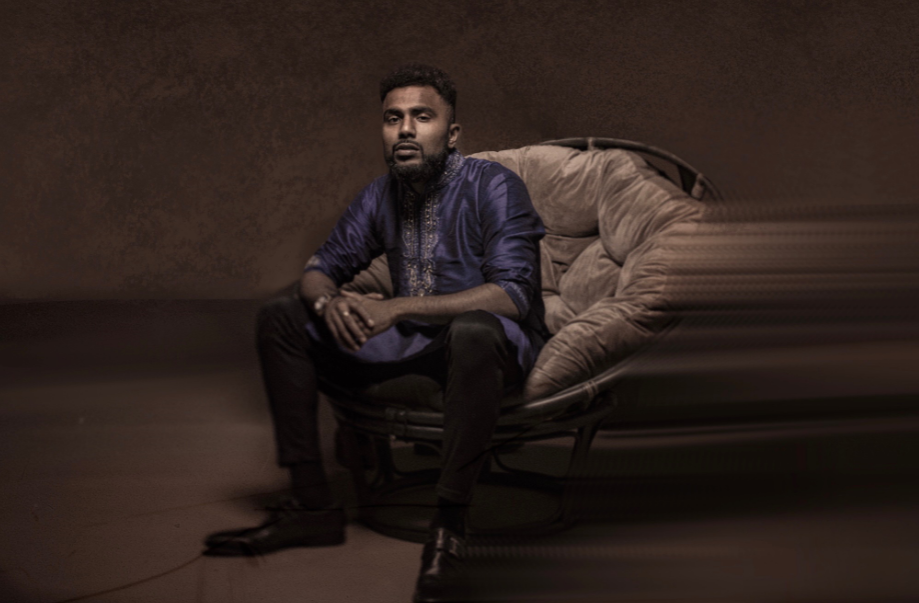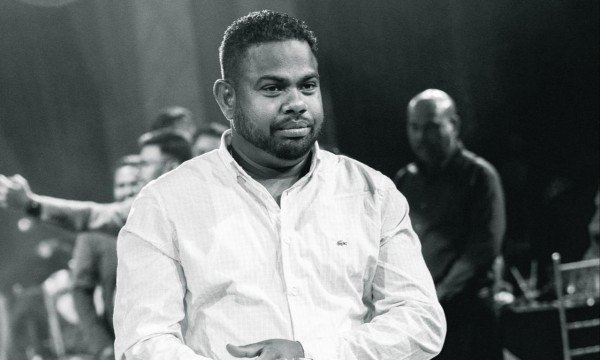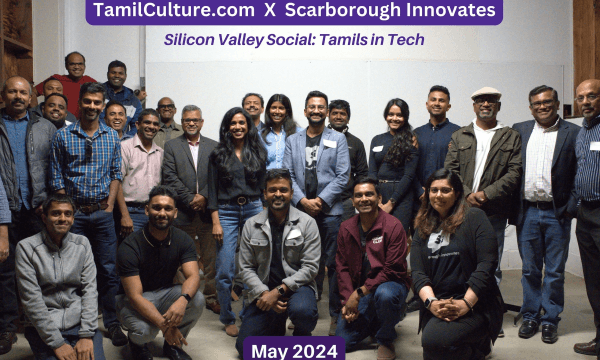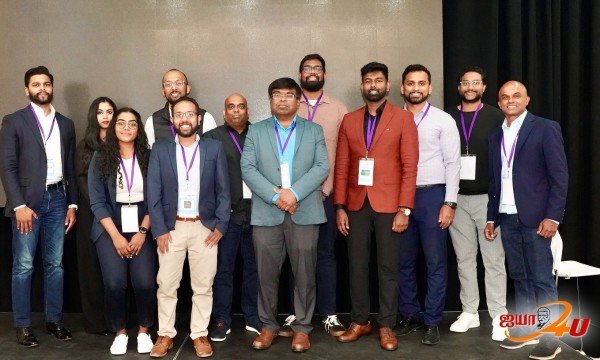
Vozhi's purpose is to build vibrant and encouraging communities, particularly around his ancestral identity, Tamil. As a deep lover of technology, Vozhi started his professional career by getting his bachelor's degree in Electrical Engineering in 2011. The next several years, he worked technical, and later managerial positions, with companies such as SAP, Microsoft, Accenture, and T-Mobile.
Always wanting to become self-sufficient entrepreneur, Vozhi found his lane by founding his real estate investing and consulting company, ‘VOZHI LLC'. Over the years, Vozhi and his team have quickly been able to establish themselves in the Seattle real estate investor community as trusted agents, partners, consultants, marketers and facilitators for various real estate projects.
***Are you or someone you know in the global Tamil community doing great things? We'd love to feature them: FILL OUT THIS FORM ***
You seem like you have the same challenge as me because you have different projects you’re working on. If somebody asked you what you do, how would you respond?
I’m a real estate investor, rapper and a community builder.
It’s not easy having multiple projects happening at once, but I do my best to categorize my brand into three main buckets: entrepreneurship, music, and community impact. Anything I give attention to gets prioritized within these buckets, and I just pick and choose the most pressing thing(s) I want to work on. Over the course of my journey, these three verticals have proven themselves to have complimentary effects towards one another, and I attribute that to the specificity of my mission statement:
“Vozhi is a company that integrates real estate entrepreneurship with culture, music and technology to inspire positive change in the community.”
It seems like the first half of your career was a bit more traditional with stints at Microsoft and Accenture. It looks like the last 2 years have been more entrepreneurial-focused. What prompted the switch?
The short answer is that I always wanted uncompromised creative, and financial control in my life.
I recall a while ago, before I went full time with my mission, I wanted to take time off between jobs. Then someone told me that the gap would “look bad” on my resume. Though this is a question I would’ve thought about differently in the past, at that particular moment I sincerely asked myself the question “look bad for who?” A deep reflection led me to realize that I don’t want to work for anybody who judged how and when I work. So I decided to not look for a job and pursued freedom instead.
Real estate currently seems to be a big focus for you in terms of time and earning potential, how did you get into this space? I’m a big believer in real estate being a source of generational wealth (if you have a long-term view on the asset class). What advice would you give to somebody looking to get into real estate investing? What is a common mistake you see people make when doing this?
I always had a passion towards entrepreneurship and told myself that I would be a business owner no matter what. The problem was I did not have a creative product or service that I could revolve my business around. Toward the end of my corporate career, I was consuming a lot of content about successful entrepreneurs and I came to understand the beauty of real estate. I realized that the best investment on earth is earth.
Real estate is the largest “product” that can be traded, and the fundamental nature of the business is quite simple: someone needs to sell, someone needs to buy and there are some logistics in the middle. As I began diving deeper and getting more knowledge on how the industry is run (all through google university!), I started envisioning a possibility where I could be a successful entrepreneur in this field. Real estate’s ability to create cashflow, equity and leverage had me hooked!
Over the years, I’ve wholesaled, flipped and transacted over $50M of transactions, and created a very positive impact in the Greater Seattle Area real estate community under the Vozhi brand.
The most common mistake I see people make is they look at the industry as a way to earn quick money. As you mentioned, my biggest advice is to take a long-term approach towards this asset class. The best thing one can do is actively invest in self-education and expanding one’s network of other like-minded investors in their target market(s). Successful investors know what they’re looking for, and how to find it.
I’m seeing more tech-heavy brokerages popping up or at least technology facilitating real estate transactions (historically a complex transaction). Is this what prompted you to make the switch from Keller Williams Realty to Compass?
No. Since the beginning of my real estate journey, I felt that one of my competitive advantages was my technical proficiency.To me, how well a brokerage is technically integrated is less important than how much market share it has and how it can help its agents get business and create influence.
With that said, I do see a lot of professionals in the real estate ecosystem continually get outdated year by year.
As an entrepreneur, how do you handle work-life balance?
My general philosophy is to just do what makes me happy and attach a marathon perspective to my goals. I do my best to create a mentality that doesn’t polarize life and work. It genuinely thrills me to work on anything real estate related, create music, and impact the community.
I feel blessed to have clarity in knowing that what I’m doing is something I’ll be building for a very long time. Balance is a calibration of being respectful of your ambitions, and simultaneously being self-aware of the consequences of your daily actions–and no one can define these metrics but you.
I know you are also a budding music artist under the “Vozhi” name. Do you see this becoming a bigger focus moving forward? Is music part of your purpose to “build vibrant and encouraging communities”? What does this mean?
Yes.
Some context–Hip hop has always played a significant role in my life. I moved to the United States from Tamil Nadu when I was 8-years-old, and having been one of the first Tamil (let alone brown families) in the greater Seattle area, I had a lot of confusion about my identity. Hip hop bridged the gap. Not only did I learn how to speak English through hip hop, I took part in lunch-room freestyles and hung out with my friends who were also into it. Throughout my entire relationship with the craft, I was not only consuming, but also secretly creating, which consisted of writing rhymes and poetry. I always had a dream of being a rapper, but due to my own self imposed limitations, such as insecurity, and fear of acceptance, I found myself being too shy to put myself out there.
Around the time I decided to pursue entrepreneurship full time, I realized a part of my life’s mission statement is to be myself fully, and authentically. This meant realizing my dream of being a rapper. Since 2018, I started taking the craft more seriously and incrementally started building my rap career. Through the release of various singles, a full album, a feature in a Kollywood song (Vellai Pookal, “Innum Sila Naatkalil”)’ and many instagram freestyles, I started to build a community that not only appreciates my music, but understands the integration of music with my overall brand.
A part of building a vibrant and encouraging community is creating a platform for full expression and non-judgement. The communities we come from don't typically encourage the pursuit of music as a career. One of my goals is to challenge this paradigm by documenting my growth.
I’ve always considered creating music to be my way of spiritually fueling myself to keep going, and my lyrics reflect how I’m feeling about myself, my experiences, and my future. I truly believe that the real metric of my musical success does not come from stream numbers and chart placements, rather it comes from the impact I have on my audience to pursue their own dreams.
I’m not a particular creative person but I have great admiration for people that are, as I have friends who are trying to make it their full-time living doing it. I think a lot of creators have trouble monetizing their content. I believe this is the “Golden Age of the Creator Economy” where it’s become much easier to do so (given you put in the work). What steps did you take to monetize your creative work?
To be honest, I don’t think I’ve scratched the surface of my content’s monetization potential. My strategy so far has been to create an ecosystem that adds value to my audience. As consumers become more savvy, they are looking for brands that connect to their beliefs. My theory is: rather than using social media to only show your accomplishments, treating it as a tool to document your progress creates a foundation of trust and loyalty with your audience. Content creates relationships, which is built on trust. No transaction can begin without trust.
I post daily content that creates direct visibility to what I’m actually doing. Though certain elements of my brand are seemingly unrelated at first glance (music and real estate?), I’ve noticed that the more consistent and authentic I’ve been with my approach, the more I’m connecting with my audience for who I am. For example, it is very common for someone to discover me through my music content, convert as a follower, consume my real estate content, and become a real estate client.
Depending on the type of creator you are, the road to monetization can be long and gruesome. It’s all about timing, but understanding your core values, and creating a brand around that is the perfect base to distribute products and services from.
What has the impact of social media been on your various ventures?
As a business that works primarily outside the internet, social media has been a great way to draw exposure to my work. Being on TamilCulture is a testament to that.
Every single post is the potential starting point of a long term relationship with your tribe. Some of the first conversations with my best clients, business partners and collaborators came originally as their responses to my instagram stories and posts.
As I continue to grow my brand and business, I will invest more into my social media to foster the relationship and engagement with my audience.
How have your family and friends supported you through your journey? Did you have any doubters?
My parents have always been encouraging and supportive throughout my journey. As an honors engineering graduate, who also landed jobs at companies like Microsoft and Accenture, my parents felt that I had already proven myself to them by the time I was beginning my journey.
Outside of my immediate family, I certainly had people in my life who couldn’t see me beyond my corporate identity. My journey towards real estate, entrepreneurship, and music initially came as a shock to many doubters. Thankfully, as someone who grew up on with rap music, I was well prepared to deal with haters. 50 told me, "Go ahead, switch the style up and if they hate then let them hate, and watch the money pile up”
_____________________________
Related Articles:
- "Meet Vijay Sappani: A Pharma Professional Who Created A Multibillion-Dollar Cannabis Business"
- "University Drop-out & Self-Taught Tamil Artist JYDXI Finds Success Through Instagram"
- "These Tamil Entrepreneurs Share How They Grew Their Side Hustles"
_____________________________
Where do you see yourself in the next 3-5 years?
On a business level, in addition to expanding my real estate portfolio as rapidly as I can, I see myself opening and operating a multinational real estate brokerage and a fund that will be financing construction projects all over the world. Considering I am the first in my family to take up space in the American real estate landscape that wasn’t originally designed for me, I often find myself wondering how I would do in an already Tamil established market.
On a music level, I see myself with a much bigger catalog of songs, and accommodating visuals. I aspire to stay consistent with my craft, gain world-renowned recognition as a talented artist, and land culturally impactful opportunities. Additionally, I plan on starting a record label to empower artists coming from lower-socio economic backgrounds. It’s always been very important for me to support and uplift the culture of the community I’m from.
On a community level, I would like to create establishments that empower people of color. I plan on scaling my collaboration with other community-minded private organizations and promote the model of conscious capitalism. Vector90 is an inspiration. Combining my passion for real estate and community, I envision putting together physical locations for under-served community members so that they can have a safe space for their creative and entrepreneurial growth.
How has COVID-19 impacted your businesses? How have you adapted?
When I first started my journey in 2016, I wrote a line “Adapt or die, I got the blueprint they gon’ clap at my rise.” I affirmed to myself that I will be tested, and that this mission will always call for pivots.
This mentality has served me well throughout the pandemic. When the world was completely immobilized, I used that time to work on what I can control. My business partner, Kasim Siddiqui and I pumped out more real estate content, created deeper engagement with our network, and focused on expanding our real estate brand. As we started doing this, we grew from our partnership of 2 to adding 5 additional real estate agents in our team.
As time progressed, our efforts paid off quite well. With COVID causing interest rates to drop, while the greater Seattle real estate market continued to grow, my team and I found ourselves more productive than ever. Going into 2021, Kasim and I are planning to add a few more agents to our team, and project this to be our highest producing year yet.
Do you have any mentors that have helped you in the progression of your career? If not, who would be somebody that you would want as a mentor now?
I’ve had a mentor in every level of my journey so far, and every one of them is now a lifelong friend.
At this point in my career, I’m convinced that a lot of what I’ve accomplished is due to the chance certain mentors took on me. One of my favorite mentors is a man named Kenny Pleasant, whom I met before I made my first dollar in real estate. He’s a relentlessly direct black man who’s real estate business model is well respected in my city. To this day, he’s one call away from great advice, but he sometimes stops shy of giving me a clear cut answer. As frustrating as this was, I realized that it wasn’t about having the “right” answer, but much more about developing the right problem solving process. Through Kenny’s approach of mentorship I learned about humility, which contributed to my growth in ways direct answers never could.
We’re also blessed to be living in an era where we don’t need to personally know our mentors to gain wisdom from them. I love watching Nipsey interviews time to time to gain inspiration.
Tell us about a major win that you’ve had so far that you’re proud of.
I would say what I’m proud of most is maintaining my relentless mentality for the past 4+ years and thriving because of it. Despite all the pain, rejections, heartbreaks, insecurities and haters trying to break my spirit, I always kept going. Any win that I have in my present-day life is attributed to my mindset.
What is a failure you’ve experienced in the last 5-10 years that you’ve learned the most from?
I do my best not to call my experiences failures. I could tell you about the time I had 10 bitcoins at once in 2017 that I should’ve never sold. Or that time, we made an expensive mistake during a property flip.
The first year of my entrepreneurial journey was when I learned the most. Having had no money, connections or resources, Kasim and I built everything from the ground up. We did everything extremely ad hoc and constantly iterated on our mistakes.
Ultimately there are wins and there are lessons. Anything that appeared like a failure during the time has always proven itself as a propellor of growth.
What is a great business idea or product that you would be working on if you weren’t focused on your current ventures?
I’m hugely interested in the startup communities in emerging nations, because I believe the impact of technology is yet to be maximized in these environments.
In fact, while I worked in the corporate world, one of my side hustles was to identify and add value to emerging technology startups in Tamil Nadu.
------------
What do you think you would tell 16-year Vozhi looking back?
I would tell myself to be fearless, and trust myself more.
At age 16, I was extremely shy, full of doubt and easily influenced by my environment. I sincerely believe that everyone has a special gift they can contribute positively to the world, but we tend to let our environments hold us back from true expression. One of my favorite quotes ever, is by Ralph Waldo Emerson: “To be yourself in a world that is constantly trying to make you something else is the greatest accomplishment."
How would you describe your dream life?
I get to make great money by being an owner in an industry that I love, and provide a blueprint for others to do the same.
I get to express myself by making music that I love with a growing audience that appreciates my craft.
I get to impact my community through various events and initiatives.
For the most part, I’m living my dream life right now.
What is your favourite book(s) you've read recently or a podcast(s) that you've listened to recently that's had an impact on you?
“The Tanning of America” by Steve Stoute — This book reinforced some of the theories I had about how hip hop runs the world, and reminded me to embrace the intersection of culture and commerce. Even before going into the corporate world, I committed to embracing my creative spirit at some point in life. I always thought that the life of an artist came without much pay, but this book taught me some monetization strategies, as well as the perspective of leverage when it comes to being a culture cultivator.
What is a new belief, behaviour or habit that has most improved your life?
Being more process oriented, and less results driven.
As an ambitious individual, it wasn’t natural for me to be able to chill between a certain action and it’s desired result. Especially with the added self-pressure to be successful, I always felt that I had to be doing something in order to be productive.
Sure, this type of grind created jolts of success that I’m proud of to this day. But overtime, I found myself burning out time and time again with unwanted stress and anxiety.
After self-reflection, I realized this type of approach was not sustainable and that I needed some serious re-evaluation. I got into some healthy habits like meditating and journaling which has been helping me appreciate the present moment more.
If you were given $1 billion, how would you allocate the money to change the world?
I would focus on setting up STEAM (Science, Technology, Engineering, Art, Math) academies around the world to eliminate race and income based educational disparities.
I believe that the best way to positively impact society and create real social change is through improving not only the quality, but also the accessibility, of education in low-income and underrepresented communities.
------------
How would you describe the impact that the Tamil community in the US (specifically Seattle) has had on your personality and your business? How would you describe the Tamil community there?
I grew up in the greater Seattle area without feeling too much Tamil representation. The closest Tamil person I could relate to was my younger brother. I’m sure there were Tamils my age scattered throughout my city, but we were rare.
During my childhood and teenage years, the US Tamil community had very little impact on me, as I felt it was non-existent. As I started getting into my twenties however, the Tamil community of Seattle started growing with a lot more young families coming from Tamil Nadu. Now, there are organizations like the Seattle Tamil Sangam, and Seattle Tamil Academy that play active roles in keeping the culture alive.
Do you think affluent members of the Tamil community contribute their fair share to philanthropic initiatives outside of the community? Any changes you’d like to see?
I don’t have enough details or knowledge on the activities of the affluent Tamil community to make a critical comment.
What I do know is that technology has democratized who gets to be a voice to provoke change. I truly believe that the resources needed to create a better world exist within all of us.
I believe in the concept of conscious capitalism. One of my goals through my work is to create a template that showcases the importance of community empowerment. If more successful businesses and organizations came out with this type of model, it will inspire the rest of the world to follow suit and create some real change.
What is your favourite Tamil food (meal or dessert)?
Nothing fancy–a classic dosai with some traditional sambar and chutney will always hit the spot.
What is your favourite Tamil movie?
That’s a very difficult question to answer, but one that I’m very inspired by is “Sivaji: the boss.” The concept of an altruistic Tamil man going back to his motherland to create a more empowering platform for his people, really stuck with me.
What does Tamil culture mean to you?
From the sound of Ilayaraja’s music, to the smell of kothu roti being made, there are a lot of things I adore about our beautiful culture. It brings me joy to represent Tamil to people who may not have heard about us. In my city especially, I’m delighted to say there are many whose first introduction to anything Tamil-related was through me. My Pakistani business partner constantly surprises me with the amount of Tamil words he knows.
Tamil is my identity and I represent it with great pride.
Connect with Vozhi via his TC profile
***Looking to create your love story? Join the other couples who have dated and got married through myTamilDate.com!***
"How France Met Canada: A MyTamilDate.com Love Story"
"How a Message on myTamilDate.com Led to an Engagement for Lavanya & Vitharan"
Related Articles:
- "Tamil Innovators Spotlight: Abarna Raj, CEO of Australian Social Startup Palmera, Is Tackling World Poverty"
- "Tamil Innovators Spotlight: Tea Drops CEO & Founder, Sashee Chandran"
- "Tamil Innovators Spotlight: Knowledgehook's CEO, Travis Ratnam"
- "Tamil Innovators Spotlight: Kabo CEO & Founder, Vino Jeyapalan"
- "Danny Sriskandarajah's Journey From Rural Sri Lanka to CEO of Oxfam Great Britain"
- "Meet Tamil-Canadian Tech Entrepreneur Mano Kulasingam"
- "The NBA Bubble: Dr. Priya Sampathkumar Helped Make It Happen"
- "These Tamil Founders Behind Agritech Startup Dunya Habitats Want To Alleviate Food Security Globally"
- "Marketing Maven Jackson Jeyanayagam Shares Insights From His Illustrious 20-Year Career"
- "Angel Investor Jay Vasantharajah On Building His Portfolio One Day At A Time"
- "Meet Tamil-Canadian Journalist Kumutha Ramanathan"
- "Breaking Into Hollywood: Meet Tamil-Canadian Actor Vas Saranga"
- "Meet Rebecca Dharmapalan - Filmmaker, Legal Scholar, And Activist"

























